Anti-Inflammatory Diet 101: What to Eat and Why It Works
Inflammation is your body’s natural defense mechanism, helping to fight off infections and heal injuries. But when it sticks around for too long, it can turn into a chronic issue—leading to problems like joint pain, heart disease, and even cancer.
The upside? What you eat can make a big difference in calming inflammation and keeping it under control.
That’s where the anti-inflammatory diet steps in. It’s built around nutrient-rich foods that help reduce inflammation and stop it from becoming a long-term threat. It’s a straightforward yet highly effective way to boost your health and feel your best. Let’s take a closer look at the top anti-inflammatory foods and the powerful ways they support your body.
What is Chronic Inflammation?
Chronic inflammation occurs when your immune system stays activated for too long. Unlike short-term inflammation, which helps with healing, chronic inflammation can damage tissues and organs over time.
Health Issues Linked to Chronic Inflammation:
- Arthritis
- Heart disease
- Type 2 diabetes
- Inflammatory bowel disease (IBD)
- Certain cancers
- Alzheimer’s and other neurodegenerative diseases
The good news is that adopting this diet can help lower inflammation and improve overall health.
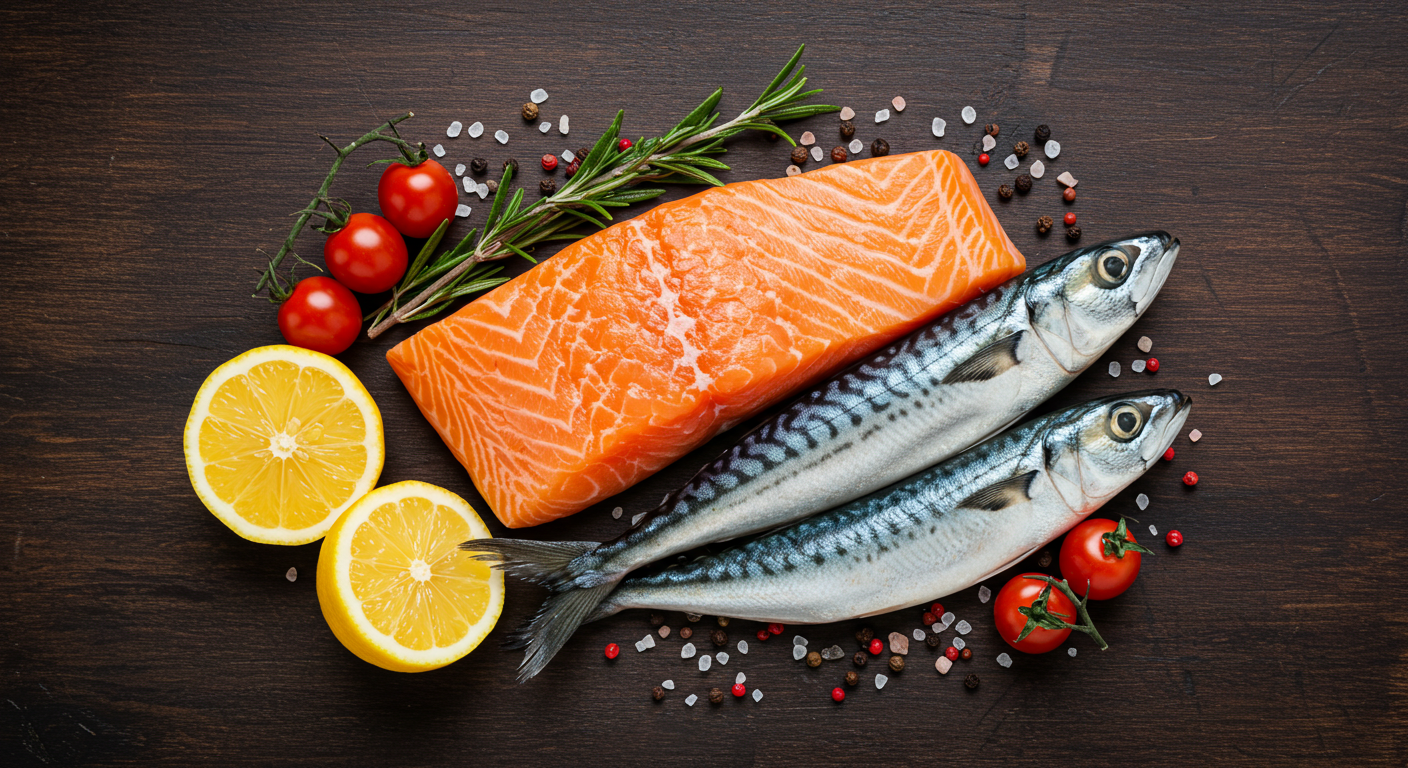
Key Foods to Include in an Anti-Inflammatory Diet
1. Fatty Fish (Salmon, Mackerel, Sardines)
Fatty fish are rich in omega-3 fatty acids, which have been shown to reduce inflammation in the body. Omega-3s help to lower the production of molecules that trigger inflammation, promoting a healthier inflammatory response. Aim to include fish like salmon, mackerel, or sardines in your meals a couple of times a week.
Benefits:
- Reduces risk of heart disease
- Supports brain health
- Alleviates symptoms of arthritis
2. Leafy Greens (Spinach, Kale, Swiss Chard)
Dark, leafy greens are packed with antioxidants and essential vitamins like vitamin K, which helps lower inflammation levels. They are also high in fiber, which promotes gut health—a key factor in inflammation regulation.
Benefits:
- Reduces oxidative stress
- Improves digestive health
- Boosts immune function
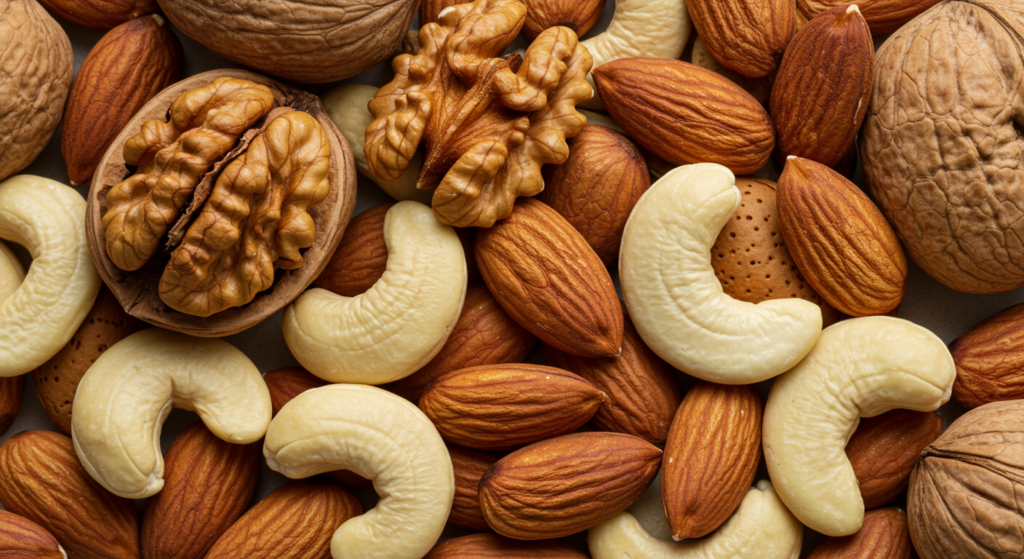
3. Nuts (Walnuts, Almonds, Cashews)
Nuts, especially walnuts, are another excellent source of omega-3s, healthy fats, and fiber. They also contain vitamin E, a powerful antioxidant that helps fight free radicals that can contribute to inflammation.
Benefits:
- Supports heart health
- Reduces cholesterol levels
- Provides long-lasting energy
4. Berries (Blueberries, Strawberries, Raspberries)
Berries are packed with anthocyanins, antioxidants that have anti-inflammatory effects. The flavonoids found in berries have been shown to lower the production of inflammatory markers in the body.
Benefits:
- Enhances brain function
- Reduces the risk of chronic diseases
- Helps control blood sugar levels
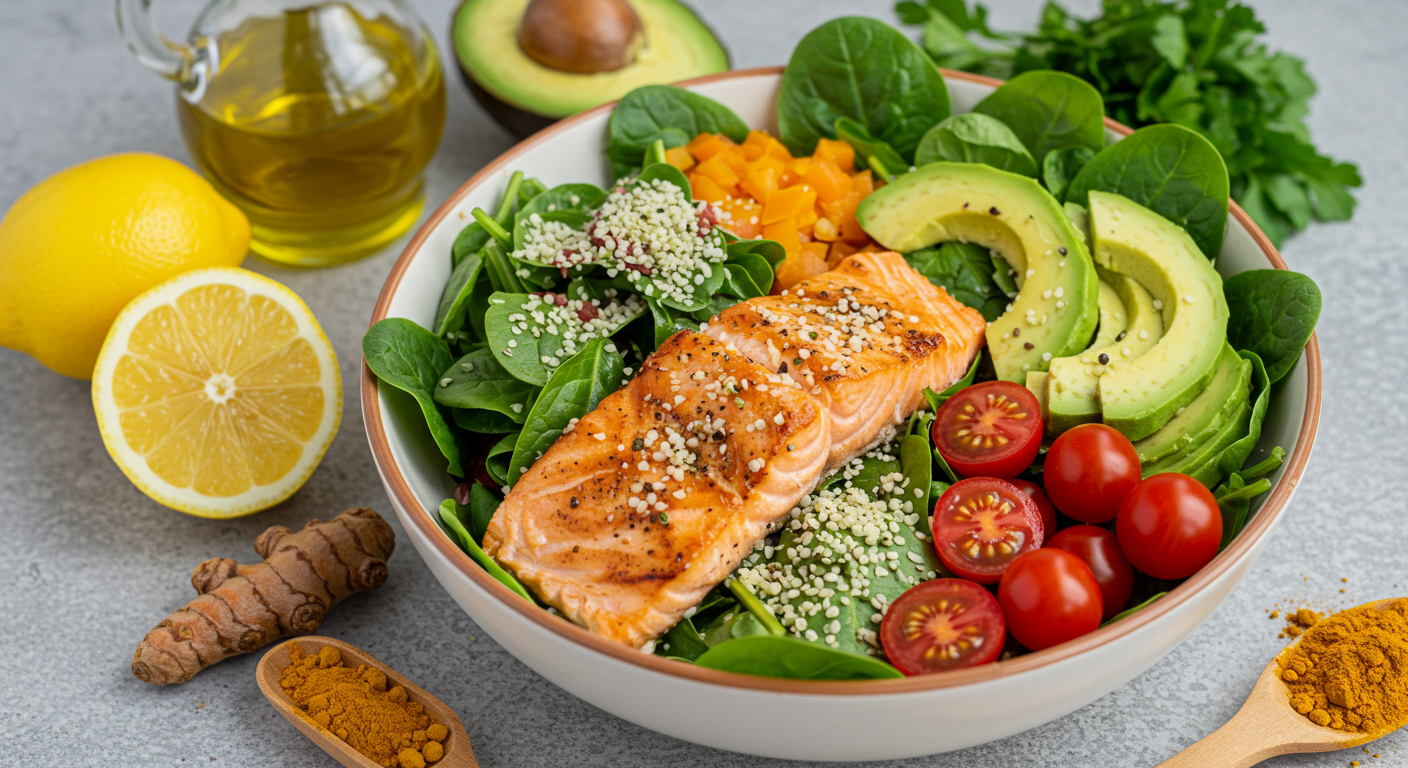
5. Olive Oil
Extra virgin olive oil is rich in oleocanthal, a compound that has similar properties to non-steroidal anti-inflammatory drugs (NSAIDs). It’s a great replacement for less healthy oils like vegetable or canola oil.
Benefits:
- Promotes heart health
- Reduces arthritis symptoms
- Supports weight management
6. Turmeric
Turmeric contains curcumin, a potent compound known for its anti-inflammatory and antioxidant properties. It’s one of the most widely used spices in traditional medicine, particularly in Ayurvedic and Chinese practices.
Benefits:
- Reduces pain and swelling
- Supports brain and liver health
- Eases symptoms of digestive disorders
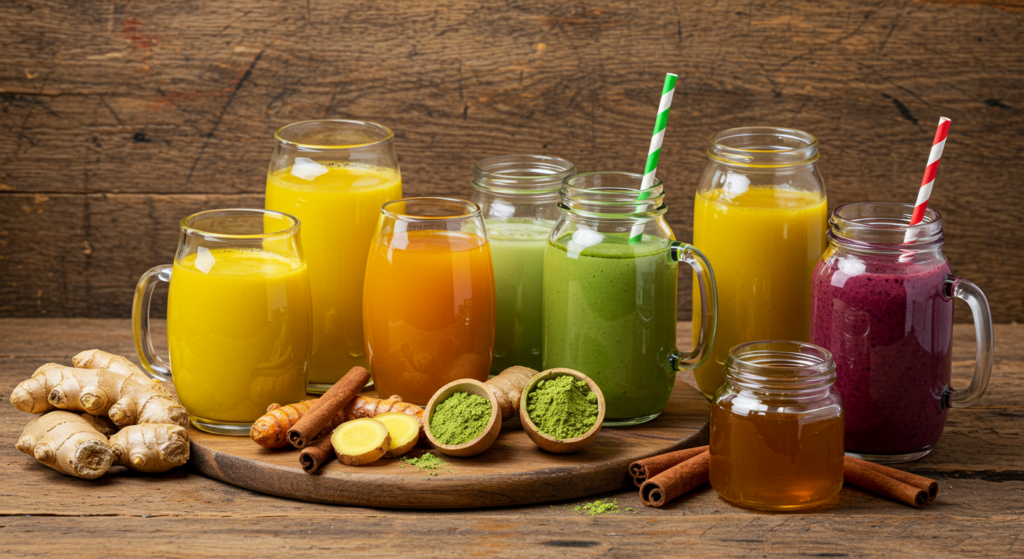
7. Tomatoes
Tomatoes are rich in lycopene, an antioxidant that helps reduce inflammation, particularly in conditions like heart disease. They’re also high in vitamins C and E, both of which play a role in managing inflammation.
Benefits:
- Supports heart health
- Protects skin from sun damage
- Reduces the risk of cancer
8. Green Tea
Green tea contains polyphenols, specifically catechins, which are known for their anti-inflammatory and antioxidant properties. Drinking green tea regularly can help reduce the markers of inflammation in the body.
Benefits:
- Boosts metabolism
- Improves brain function
- Supports immune health
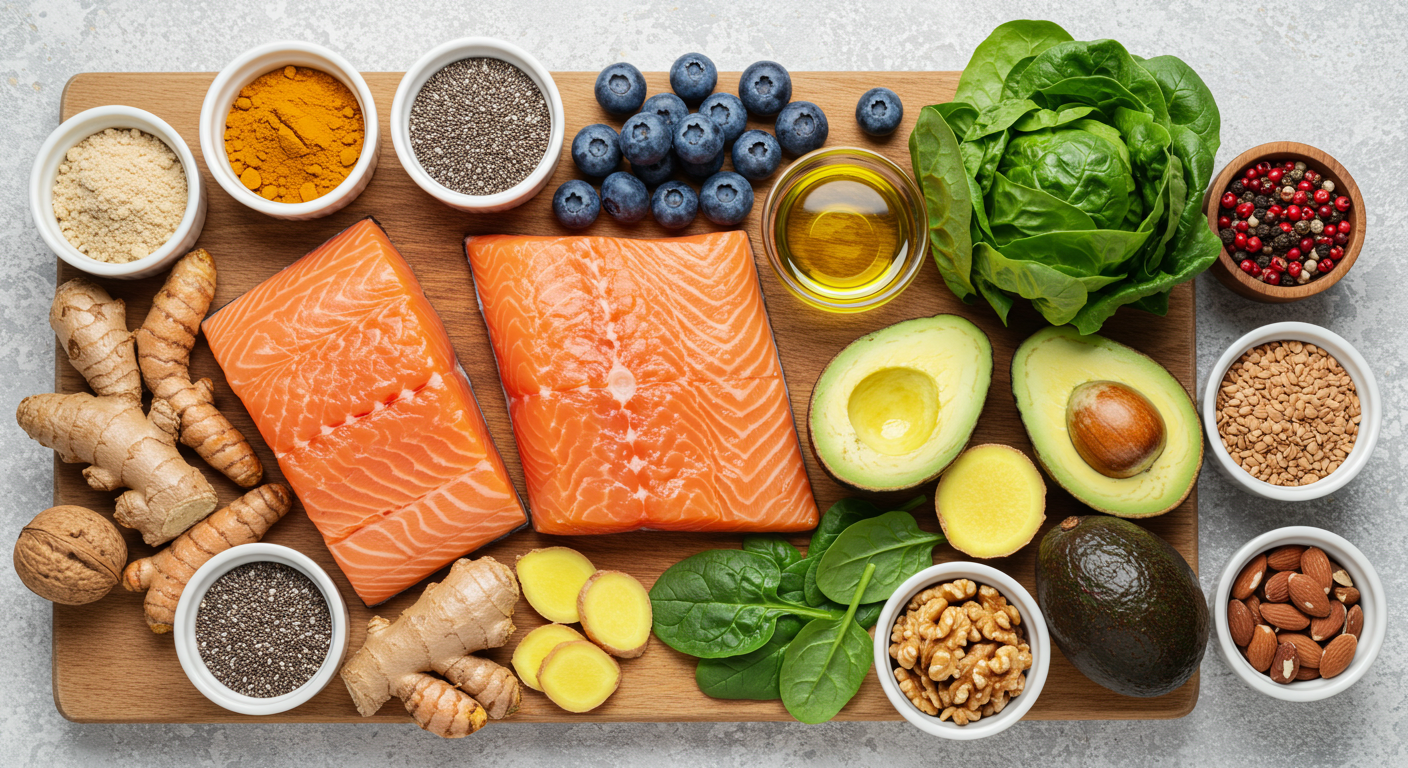
9. Ginger
Ginger has long been known for its ability to reduce inflammation. It contains compounds like gingerol, which help to reduce oxidative stress and prevent the onset of chronic inflammatory conditions.
Benefits:
- Reduces nausea and digestive discomfort
- Eases joint pain and inflammation
- Supports healthy blood sugar levels
10. Whole Grains (Brown Rice, Quinoa, Oats)
Unlike refined grains, whole grains are rich in fiber, antioxidants, and anti-inflammatory compounds. Consuming them can help regulate blood sugar and reduce inflammation associated with metabolic syndrome.
Benefits:
- Reduces the risk of type 2 diabetes
- Helps maintain a healthy weight
- Supports gut health
Foods to Avoid for Reducing Inflammation
While focusing on anti-inflammatory foods, it’s equally important to avoid those that promote inflammation. These include:
- Processed foods: High in trans fats and sugars, these can increase inflammation and contribute to various chronic diseases.
- Refined carbohydrates: Foods like white bread and pastries can spike blood sugar levels, leading to increased inflammation.
- Sugary drinks: Excess sugar promotes inflammation, particularly in the joints and cardiovascular system.
- Red and processed meats: These meats can trigger inflammation due to their high saturated fat and chemical content.

How the Anti-Inflammatory Diet Improves Your Health
By focusing on whole, nutrient-dense foods that naturally fight inflammation, you’re doing more than just reducing pain and swelling. You’re also improving your long-term health. The benefits of this diet include:
- Reduced risk of chronic diseases: Heart disease, diabetes, and arthritis are all linked to chronic inflammation. By lowering inflammation, you reduce your risk of developing these conditions.
- Better digestion: A healthy gut plays a crucial role in managing inflammation. The fiber-rich foods in this diet support a balanced gut microbiome.
- Improved mood and energy levels: Chronic inflammation has been linked to mental health issues such as depression and anxiety. A diet rich in anti-inflammatory foods can help enhance mood and energy levels.
- Enhanced immune function: Anti-inflammatory foods like citrus fruits, garlic, and mushrooms support a healthy immune system, helping you fight off infections more effectively.
Conclusion
An anti-inflammatory diet isn’t just about what you avoid; it’s about what you add to your plate. By including foods that help reduce inflammation, like fatty fish, leafy greens, nuts, and berries, you can improve your overall health and protect your body from chronic diseases. It’s a simple yet powerful way to support your well-being—one bite at a time.
So, next time you’re planning your meals, remember: the more you focus on fresh, whole foods and steer clear of processed options, the better equipped you’ll be to manage inflammation and improve your health.
Feel inspired to adopt the anti-inflammatory diet? Let us know how you plan to add more of these healing foods to your meals!
Sources
- Harvard T.H. Chan School of Public Health
- Academy of Nutrition and Dietetics
- Harvard Health Publishing
- MCT Oil: The Fast-Acting Fat That Fuels Your Brain and Burns Fat - April 25, 2025
- Green Tea Extract for Fat Loss - April 24, 2025
- Fat Loss Supplements to Avoid - April 23, 2025
